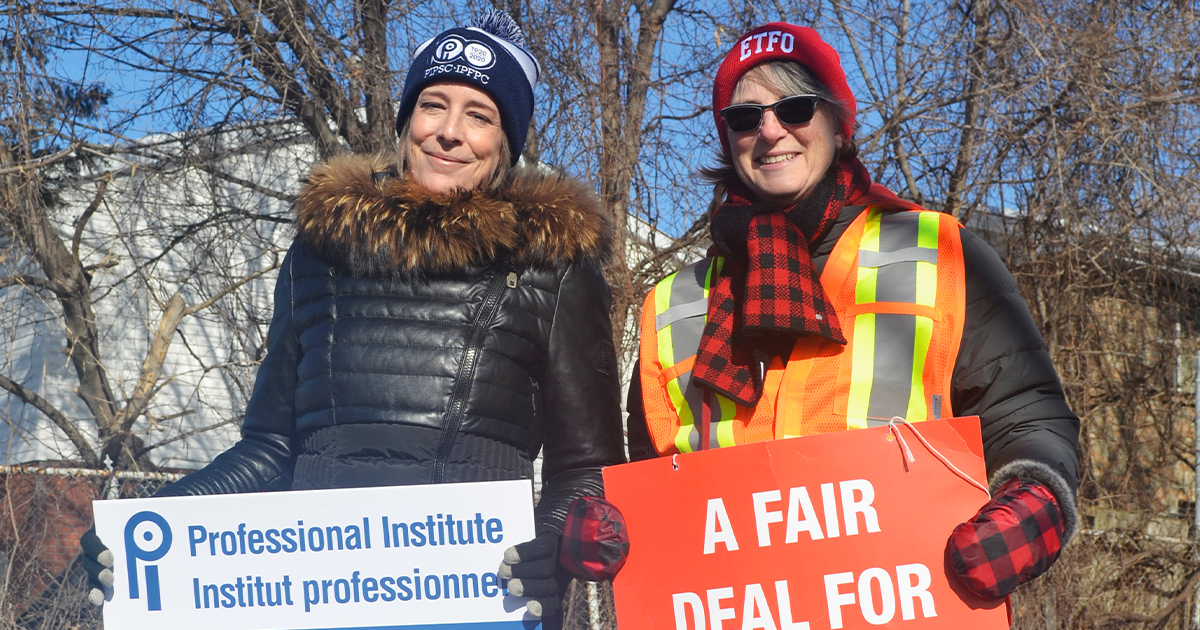We're proud to join eleven Ontario unions representing more than 250,000 provincial public sector employees in a coordinated Charter challenge against Bill 124.
“Bill 124 is a direct attack on our members and on workers’ rights in Ontario,” said President Debi Daviau. “We will fight this law and the dangerous precedent it sets for labour rights in our country.”
Bill 124, euphemistically named the Protecting a Sustainable Public Sector for Future Generations Act, violates the Charter-protected right to free and fair collective bargaining. It allows the provincial government to impose salary caps, including for pensions and benefits, on a variety of unionized and non-unionized public sector workplaces.
Workers affected by Bill 124 include those employed by the provincial government, crown agencies, school boards, universities and colleges, hospitals, non-profit long-term care homes, children’s aid societies, social service agencies and the electricity and energy sectors. This includes PIPSC members in the following groups:
Labour leaders in Ontario are determined to see an end to Bill 124.
The Ontario Labour movement, with the Power of Many, will be initiating a public campaign to repeal Bill 124.
The Ontario Federation of Labour (OFL) is leading the charge. “The OFL stands in solidarity with the education unions that have recently launched their challenges to the application of Bill 124 in the education sector, as we escalate the opposition to this government’s continued attack on the Charter rights of all Ontarians. Together, we are launching an aggressive campaign to demand the Ford Conservatives repeal this unconstitutional legislation,” said Patty Coates, OFL President.
“This challenge is about defending workers’ rights protected under the Charter of Rights and Freedoms,” stated CUPE Ontario President Fred Hahn. “When the Ford Conservatives demand that we must all do our part, instead of targeting working people the government should be taxing profitable corporations and the wealthiest in our communities. Charter rights matter, human rights matter, workers’ rights matter.”
“For workers in equity-seeking groups – racialized workers, workers with a disability, Indigenous workers, and women, collective agreements are essential to ensuring fairness in the workplace,” said Sharleen Stewart, President of SEIU Healthcare. “For the government to set limits on bargaining undermines the rights of workers who already face systemic discrimination across the board.”
In recent years, unions have successfully coordinated together to challenge legislation that violates workers’ rights, such as the Liberals’ Bill 115, which interfered with collective bargaining in the education sector. The courts ruled that Bill 115 violated workers’ Charter rights. In the face of legal challenges, a coordinated resistance campaign, and public opposition, the bill was repealed.
The joint Charter challenge announced today is being brought by a coalition of public and private sector unions that represent workers across the broader public sector, including:
- Canadian Union of Public Employees (CUPE)
- Service Employees International Union (SEIU Healthcare)
- United Steelworkers (USW)
- Public Service Alliance of Canada (PSAC)
- Society of United Professionals (IFPTE) Local 160
- Canadian Office and Professional Employees Union (COPE Ontario)
- AMAPCEO
- International Brotherhood of Electrical Workers (IBEW)
- Professional Institute of the Public Service of Canada (PIPSC)
- United Food and Commercial Workers (UFCW) Local 175
- Ontario Nurses Association (ONA)
Additional unions and organizations representing public sector workers in Ontario are expected to join this coordinated challenge or pursue their own separate legal challenges to Bill 124 in the coming weeks.


